Shrink Your Bills, Save the Planet: A Guide to Environmentally Conscious Water Heating
By Brian on August 1, 2025
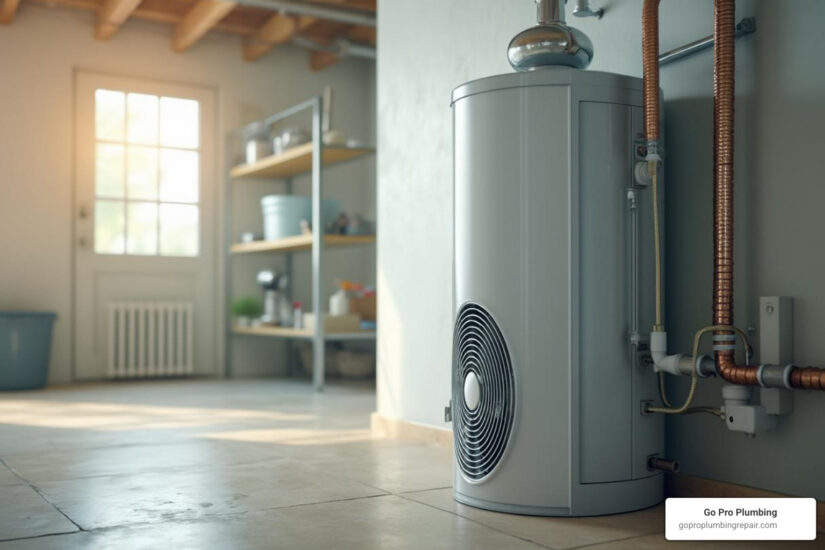
Why Your Water Heater Matters for the Planet (and Your Wallet)
What are environmentally friendly water heaters? They are systems designed to heat your home’s water using less energy and with reduced environmental impact. Key types include:
- Heat Pump Water Heaters (HPWHs): These models move heat from the air instead of creating it, using much less electricity.
- Tankless (On-Demand) Water Heaters: They heat water only when you need it, eliminating the energy waste of keeping a large tank of water constantly hot.
- Solar Water Heaters: These systems use the sun’s energy directly to heat water, making them a highly renewable option.
Your water heater works daily, heating water for showers, dishes, and laundry. Water heating accounts for about 18% of a U.S. household’s energy consumption—a significant part of your energy bill. Traditional water heaters often use excessive energy, leading to higher costs and a larger carbon footprint.
Modern environmentally friendly water heaters offer a smarter solution. They help you shrink utility bills and reduce your environmental impact. For property owners in Northern California, switching to an eco-friendly model is a clear win that saves money, conserves resources, and supports a healthier environment.
This guide will walk you through the best options, explaining how they work, their benefits, potential savings, and installation details. Get ready to make a smart move for your home and the Earth.
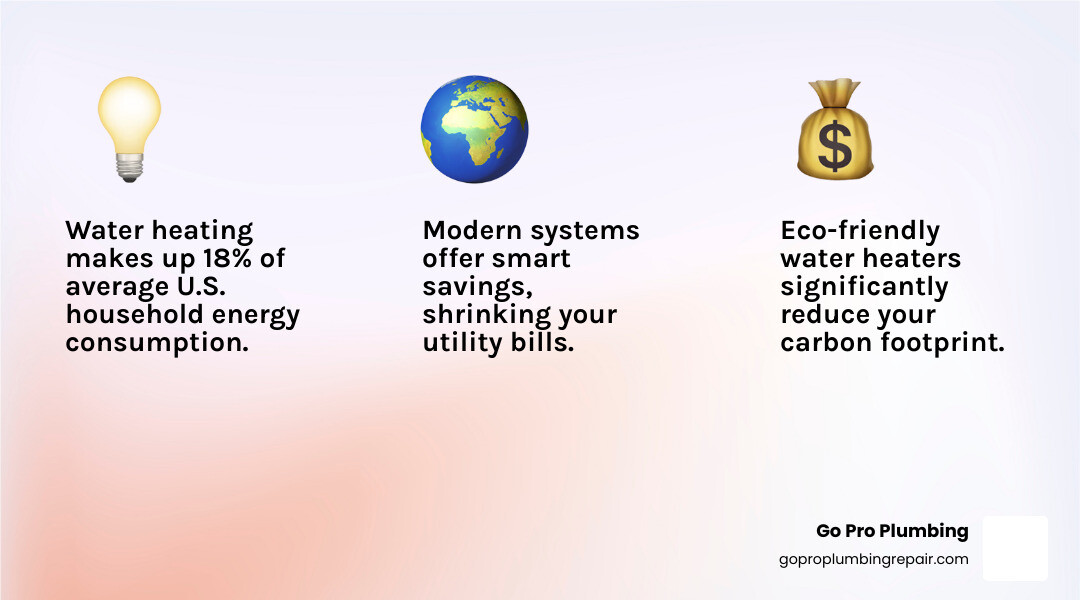
Key terms for environmentally friendly water heaters:
Exploring the Main Types of Environmentally Friendly Water Heaters
Upgrading to an environmentally friendly water heater is like switching from a flip phone to a smartphone—smarter and more efficient. Unlike old tank heaters that constantly waste energy, these modern systems significantly cut energy use and reduce emissions.
At Go Pro Plumbing, we help our Northern California neighbors find the perfect Energy Efficient Water Heater for their home and budget, guiding them through the latest innovations.
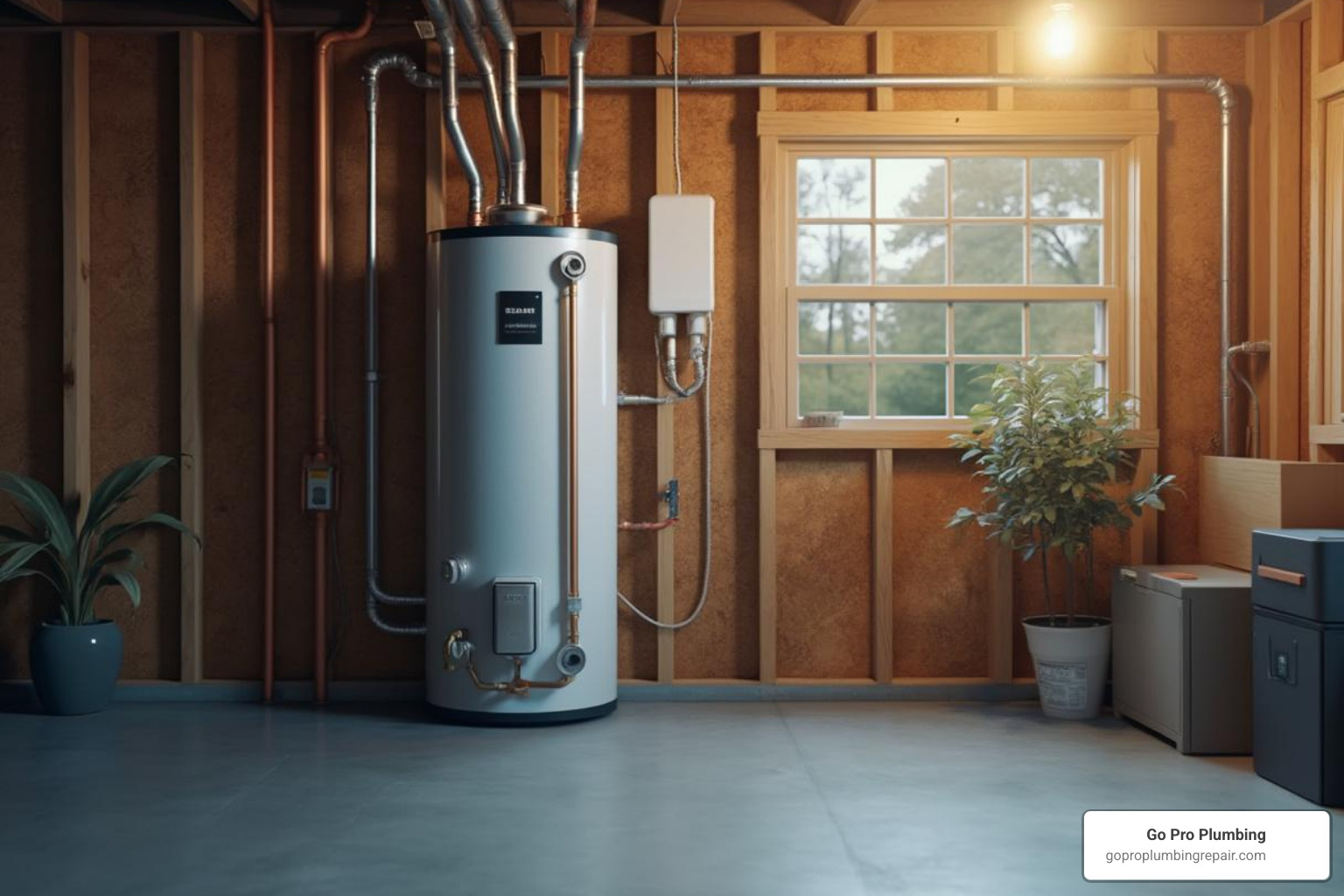
Heat Pump Water Heaters (HPWHs): Moving Heat, Not Making It
A heat pump water heater (HPWH) works like a refrigerator in reverse. Instead of creating heat, it pulls warmth from the surrounding air and transfers it to the water in its tank, making it incredibly efficient.
These environmentally friendly water heaters are usually two to three times more energy efficient than your old electric water heater. Some can even be an incredible 400% efficient! As a bonus, HPWHs also cool and dehumidify the space they occupy, making areas like garages or basements more comfortable. An ENERGY STAR certified electric water heater can save a family of four around $600 each year on electricity. Over its lifetime, that could add up to more than $4,500! For ENERGY STAR heat pump water heaters, the savings are even bigger, potentially saving about $550 every year and over $5,600 across the unit’s lifespan. That’s a lot of cash staying in your pocket!
Want to learn more about how these amazing appliances qualify as a Super-Efficient Water Heater ? Head over to the ENERGY STAR website for all the details.
Tankless (On-Demand) Water Heaters: Hot Water When You Need It
Tankless water heaters solve the problem of running out of hot water. They don’t use a storage tank; instead, they heat water instantly when you need it. This on-demand system provides endless hot water and eliminates the energy wasted keeping a tank hot 24/7.
This “on-demand” way of working makes them super efficient. For homes that use 41 gallons or less of hot water daily, tankless models can be up to 34% more energy-efficient than traditional ones. Even if your family uses a lot of hot water, you can still see efficiency gains of around 14%. This also reduces water waste, as you no longer have to run the faucet waiting for it to warm up!
You can find tankless units in both gas and electric models. Electric tankless water heaters are especially impressive, reaching nearly 100% efficiency. When they’re powered by renewable energy, they can even achieve almost zero emissions. Curious if a tankless unit is right for you? We’ve got a detailed guide that answers the question: “Are Tankless Water Heaters More Efficient?“. Be sure to check it out!
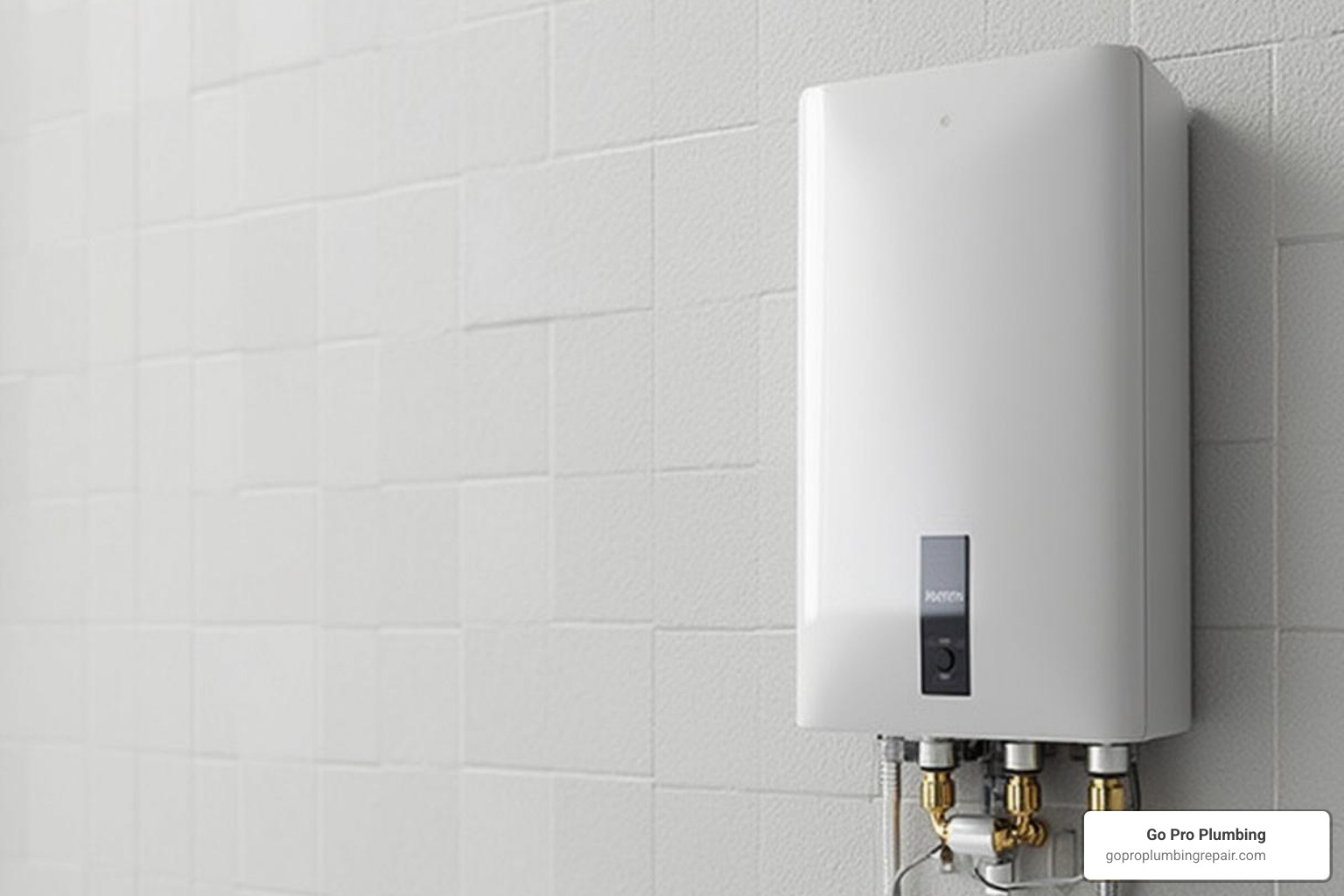
Solar Water Heaters: Using the Sun’s Power
Solar water heaters are a fantastic eco-friendly choice. They use collectors, typically on your roof, to absorb solar energy, which then heats water in a storage tank.
There are two main types: active systems use pumps to move water or a special heat-transfer fluid around, while passive systems rely on natural convection. While solar water heaters are amazing for cutting down on traditional energy use, they typically include a backup electric or gas heater. This means you’ll always have hot water, even on cloudy days or when your family needs a lot of it.
Want to understand the magic behind these systems? Our guide “How Do Solar Water Heaters Work?” breaks it all down. Using solar thermal systems to heat water is more efficient than using solar panels to generate electricity for the same purpose. It’s a direct and powerful way to go green!
The Financial Upside: Savings, Rebates, and Tax Credits
With environmentally friendly water heaters, you can save the planet and money. While the initial cost may be higher than a traditional tank, it’s a smart investment that pays off in long-term savings—a win-win for your wallet and the Earth.
At Go Pro Plumbing, we help Northern California residents understand the financial aspects of these upgrades. Knowing your potential Water Heater Energy Savings is a key step in choosing the right system.
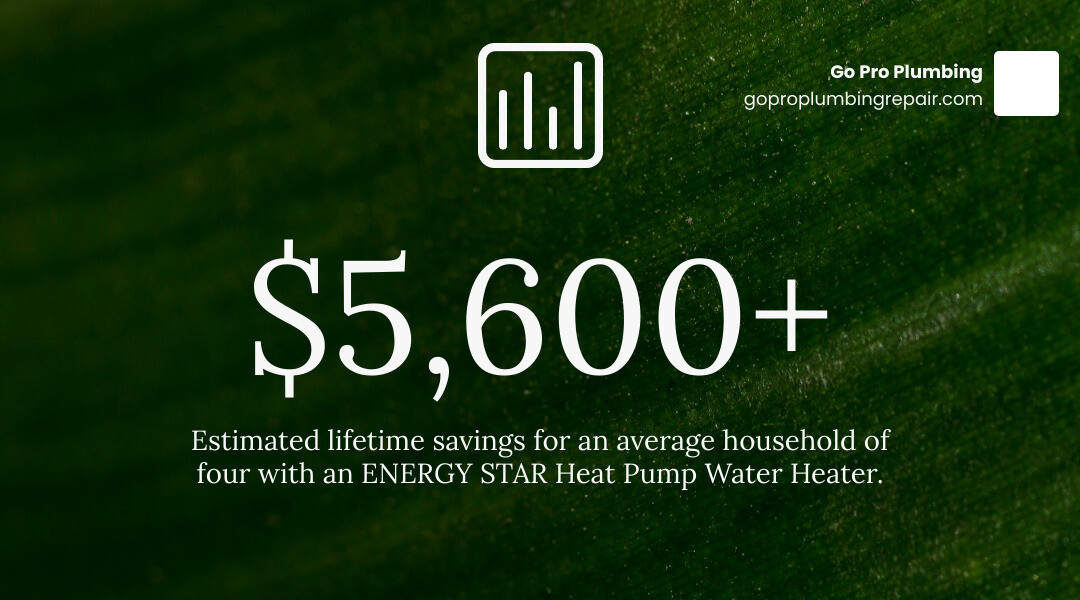
Key Financial Benefits of Environmentally Friendly Water Heaters
The financial advantages of switching to an eco-friendly water heater are compelling. For starters, you’ll see significantly lower utility bills. An ENERGY STAR certified heat pump water heater can save an average household of four about $550 every single year. Tankless models also deliver impressive savings by completely eliminating the wasteful “standby heat loss” that traditional tanks suffer from.
Beyond monthly savings, installing an environmentally friendly water heater can also lead to an increased home value. Today’s homebuyers seek energy-efficient features. An upgraded, eco-friendly water heater is an attractive selling point that can boost your home’s appeal and resale value.
These systems offer fantastic long-term savings. They’re built to be incredibly efficient and durable. In fact, many heat pump water heaters can pay for their initial investment in energy savings in as little as three years for an average household of four. After that, it’s pure savings for the entire lifespan of the unit. Some heat pump systems can even save you up to 71% on your hot water running costs!
Tapping into Tax Credits and Rebates
Beyond lower bills and increased home value, governments and utility companies offer great incentives to encourage homeowners to adopt energy-efficient technologies.
-
Federal Tax Credits: The federal government provides awesome incentives to make these upgrades more affordable. If you choose a heat pump water heater that has earned the ENERGY STAR heat pump water heaters certification, you could be eligible for a federal tax credit of 30% of the cost, up to $2,000. That’s a direct reduction on your tax bill!
-
Inflation Reduction Act (IRA): This groundbreaking legislation offers even more fantastic opportunities. By early 2024, the IRA is set to provide rebates of up to $1,750 for low- and moderate-income homeowners who install heat pump water heaters. This is a game-changer, making these energy-saving systems more accessible than ever before!
-
State and Local Programs: Don’t forget to check locally! Many states and local utility companies, including those right here in Northern California, offer their own rebates and incentives for installing environmentally friendly water heaters. It’s always a smart move to check with your local utility provider to see what programs are available in your area. The best part? These local incentives can often be combined with federal benefits, making your new eco-friendly water heater even more budget-friendly.
Practical Considerations: Installation, Space, and Climate
Choosing an environmentally friendly water heater means finding the right fit for your home. It’s not just about efficiency; you must consider installation, space, and Northern California’s climate.
Professional installation is crucial for safety, efficiency, and code compliance. The Go Pro Plumbing team ensures your new system is set up perfectly, as detailed in our The Ultimate Guide to Tankless Water Heater Installation. We make sure your new system is set up perfectly from day one.
Installation and Space Requirements
Different types of environmentally friendly water heaters have different needs when it comes to installation and the space they occupy:
- Heat Pump Water Heaters (HPWHs): They pull heat from the air around them, so they need plenty of room to “breathe.” This usually means they require about 700 cubic feet of surrounding air space. Some newer models can manage with a bit less, around 450 cubic feet. Basements, garages, or larger utility rooms are often ideal spots. They also produce condensation, so they’ll need a handy drain nearby.
- Tankless Water Heaters: These units are champions of space-saving! They’re quite compact and can often be mounted right on a wall, freeing up valuable floor space. This is a huge plus for smaller homes or tight utility closets. However, electric tankless models often need a dedicated 220V electrical circuit, which might mean upgrading your home’s electrical panel. Gas tankless units, on the other hand, need proper venting to the outside for safety.
- Solar Water Heaters: These systems require adequate roof space for the solar collectors to soak up those rays. Inside, you’ll still need space for an insulated storage tank. Proper placement of collectors on the roof is crucial for maximum sun exposure.
Climate and Geographic Suitability
Northern California’s climate plays a role in choosing the best environmentally friendly water heater:
- Heat Pump Water Heaters (HPWHs): These work most efficiently in spaces that don’t regularly dip below 38°F. If it gets too cold, they might have to use a backup electric heating element, which uses more energy. Northern California’s mild climate makes HPWHs a fantastic and efficient choice for most local homes.
- Solar Water Heaters: It’s no surprise that solar water heaters thrive in sunny regions. Northern California certainly gets its fair share of sunshine, making solar a very viable option. However, it’s smart to think about local weather patterns, especially during winter. That’s why a reliable backup system (usually electric or gas) is essential to ensure you always have hot water.
- Tankless Water Heaters: The efficiency of tankless units can sometimes be influenced by how cold the incoming ground water is. In areas with very chilly incoming water, a tankless unit might have a slightly lower hot water flow rate. However, modern tankless units perform well across a wide range of incoming water temperatures, making them a solid choice for most climates.
Longevity and Upkeep: What to Expect from Your Eco-Friendly Unit
Like any appliance, your water heater needs care to run efficiently. The great news is that environmentally friendly water heaters are designed for durability and can often outlast traditional models, making them a smart investment that keeps giving back.
At Go Pro Plumbing, we’re here to help you keep your water heater in tip-top shape. We offer essential Water Heater Maintenance Service to make sure your eco-friendly unit performs beautifully for many years to come.
Lifespan Comparison
Let’s take a quick look at how long you can expect different water heaters to stick around:
- Traditional Tank Water Heaters: These familiar models usually last about 8 to 12 years. They’re built sturdy, but constantly heating and cooling water, plus dealing with internal rust, eventually takes its toll.
- Tankless Water Heaters: With proper care, tankless water heaters can last 20 years or more—nearly double the life of a traditional tank. Their on-demand operation reduces wear and tear, contributing to their longevity.
- Heat Pump Water Heaters (HPWHs): HPWHs generally last longer than standard tank heaters with less maintenance. Their durable technology provides peace of mind and long-term energy savings.
Maintenance Needs for Environmentally Friendly Water Heaters
Even though these units are designed for a long life, they have a few specific maintenance tasks to keep them in peak condition.
- Heat Pump Water Heaters (HPWHs): The main task for your HPWH is to clean its air filter regularly. This is crucial for good airflow and efficient heat transfer, ensuring your unit runs smoothly and saves you money. You should also check the condensate drain line occasionally to ensure it’s not clogged.
- Tankless Water Heaters: For tankless units, especially in areas with hard water (like some parts of Northern California), the most vital maintenance step is descaling. Mineral deposits can build up inside the heat exchanger, reducing efficiency. We usually recommend professional descaling every 1 to 2 years, depending on your water hardness.
- Solar Water Heaters: These sun-powered systems benefit from periodic check-ups. You’ll want to inspect the solar collectors, check fluid levels (if applicable), and make sure the pumps are working correctly. Keeping the collectors clean also helps them absorb as much sun as possible.
No matter which type of environmentally friendly water heater you choose, annual maintenance is key to keeping it performing at its best. This small investment pays off in lower energy bills and a longer unit lifespan.
Frequently Asked Questions about Eco-Friendly Water Heaters
Upgrading to a new type of water heater naturally brings questions. Here, we answer some of the most common questions our Northern California customers ask about environmentally friendly water heaters to help you make a confident choice.
How do smart technologies improve eco-friendly water heaters?
Smart technology in modern environmentally friendly water heaters gives you control from your phone. These tools make your life easier and your home more energy-efficient.
With app-based controls, you can adjust your water temperature, check energy usage, or switch modes with just a few taps. Many smart systems offer energy usage tracking, providing clear insights into your hot water consumption and potential savings.
With advanced scheduling, you can program your unit to operate during off-peak hours when electricity rates are lower. A heat pump water heater can act like a “hot water battery,” heating water when electricity is cheapest and cleanest, ready for your morning shower. For times you’re out of town, a simple vacation mode feature minimizes energy use until you return. Some even have demand-response scheduling, allowing your unit to subtly adjust during peak grid times for potential incentives. It’s all about smarter, greener living!
Can an eco-friendly water heater provide enough hot water for my family?
A common concern is whether an eco-friendly unit can provide enough hot water. The answer is yes, with proper sizing. Our Go Pro Plumbing experts excel at determining the right size for your family’s needs.
For Heat Pump Water Heaters (HPWHs), we look at the First-Hour Rating (FHR). This tells you how many gallons of hot water the heater can deliver in an hour. For HPWHs, we often suggest a slightly larger tank than you’d choose for a traditional model. This helps the heat pump work more efficiently and reduces reliance on the backup heating element during peak demand.
With Tankless Water Heaters, we talk about Gallons-Per-Minute (GPM). This measures how much hot water the unit can produce continuously. Our plumbers assess your family’s peak hot water needs to recommend a tankless unit with the right GPM for an endless supply. With professional guidance, your new eco-friendly unit will meet your demands.
What is the most eco-friendly water heater option?
The “most” eco-friendly option depends on your specific home, climate, available energy sources, and hot water usage. Let’s break down the top contenders.
For many homes in Northern California, Heat Pump Water Heaters (HPWHs) are often the champions for electric systems. Their incredible efficiency (up to 400%!) means they use significantly less electricity. If your home’s electricity comes from renewable sources, an HPWH can achieve a super low carbon footprint.
Solar Water Heaters are hard to beat for direct renewable energy. They harness the sun’s natural power, a limitless and clean source. While they usually include a backup system, the majority of your hot water can come straight from the sun, making them incredibly sustainable.
If natural gas is your main fuel, a High-Efficiency Tankless Gas Water Heater is a huge step up from a traditional gas tank. By only heating water on demand, they eliminate wasteful “standby heat loss,” leading to reduced emissions. Electric Tankless Water Heaters powered by renewable energy are another great choice, thanks to their near 100% efficiency.
The best eco-friendly choice for you balances efficiency, cost, and your living situation. Our team at Go Pro Plumbing can help you weigh these factors to make an informed decision for your home and the planet.
Make the Sustainable Switch Today
Switching to an environmentally friendly water heater is a smart step for your home, your wallet, and the planet. It means lower monthly bills and the satisfaction of building a greener future with smart, sustainable hot water.
We’ve covered the best options, from heat pumps and tankless units to solar systems. We’ve also explored financial incentives like tax credits and rebates, along with practical considerations for installation, space, and maintenance.
At Go Pro Plumbing, we’re committed to outstanding customer service, offering same-day service to our clients across Rancho Cordova, Sacramento, and all of Northern California. Whether you’re curious about Solar Water Heaters Services or any other type of environmentally friendly water heaters, our expert team is here to help.
We’ll help you find the perfect system, ensure proper installation, and provide tips to keep your bills low. Don’t wait for your old water heater to fail. Take charge of your home’s energy use today. Call Go Pro Plumbing, and let’s make your home more sustainable.
